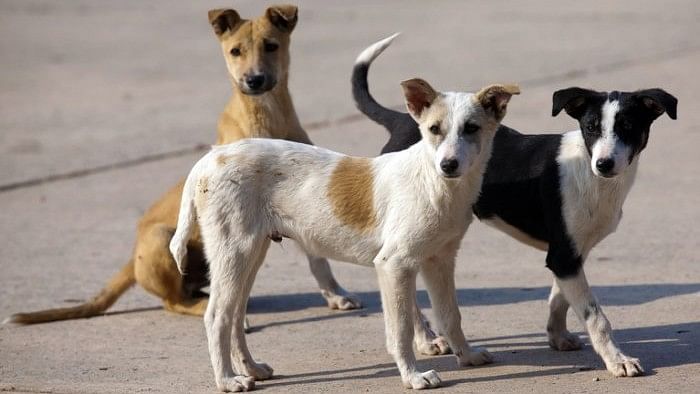
Citizens want the Bruhat Bengaluru Mahanagara Palike (BBMP) to take responsibility for controlling the stray dog population or to establish enough shelter homes to house them.
Credit: iStock Photo
Bengaluru: The tragic death of a 76-year-old woman in an attack by a pack of ferocious stray dogs in Jalahalli on Wednesday has set alarm bells ringing about the safety of elders and children, especially in the outer areas.
Citizens want the Bruhat Bengaluru Mahanagara Palike (BBMP) to take responsibility for controlling the stray dog population or to establish enough shelter homes to house them.
BBMP officials who inspected the Jalahalli area say it is prone to the stray dog menace. They emphasised that the civic body has initiated measures to address the problem in Jalahalli and other parts of the city, but noted that these efforts will take time to show results.
Relocating strays to shelter homes is not an option as the law does not permit relocation of street dogs, they say.
Vaccination drive
Recently, a vaccination drive for stray dogs was conducted in the area. A BBMP official said, "The Air Force station officer also reported stray dog issues in the area. Our teams are working on solutions, but these efforts take time."
Suralkar Vikas Kishore, Special Commissioner (Health and Animal Husbandry), BBMP, said: "We plan to neuter around 50,000 dogs this year. Controlling the stray dog population is our priority. As per our estimate, close to 50% of the dogs in the city have already been neutered. However, it takes time for these efforts to have a visible impact."
The civic body is also collaborating with NGOs to analyse dog behaviour.
The father of a 12-year-old child, recently attacked by stray dogs in OMBR Layout, said that the BBMP should take immediate action to shelter these dogs elsewhere.
"There are 34 dogs in our area because many people feed them. The dogs are untrained and sometimes become aggressive. I had to spend Rs 8,000 on vaccination and treatment for my child. The government should establish shelters for these dogs and implement a large-scale sterilisation programme," he said.
A resident of Banaswadi echoed this sentiment, saying the BBMP, which expects citizens to abide by the rules, should also be held accountable.
Amit Nigli, from Banaswadi Rising, a residents' welfare association, said: "If the BBMP or the government expects us to take care of pets in our homes, it should also recognise its duty to take care of the street dogs so they do not become a threat to pedestrians. The BBMP should establish shelters where citizens can feed or even adopt dogs."
Animal activists say intense sterilisation programmes are the only way to prevent such incidents.
An animal activist said aggressive neutering was the best course of action.
"This is an isolated incident. Relocation and culling of dogs is illegal in India. The only legal way to reduce this is through aggressive neutering and vaccination. Bengaluru has successfully reduced the number of rabies deaths using this method. The BBMP, animal activist groups, citizens and private and public organisations must work together to prevent potential dog attacks. Feeders play a crucial role, as the only way to capture dogs for vaccination and neutering is by luring them with food," she explained.
Another resident pointed out that irresponsible feeding, particularly by those near meat shops, can contribute to the dogs' aggressive behavior.
Why do stray dogs get aggressive?
According to dog psychologist Amrut Hiranya, aggression increases among dogs towards the end of the monsoon, their mating season. "Male dogs exhibit hormonal aggression, which they cannot control," he said.
BBMP officials also noted that hunger and irregular feeding by citizens could also result in such aggressive behaviour.
How to stay safe from attacks
1) Carry an umbrella and open it to appear larger, which may deter the dog.
2) Blowing a whistle or making high-pitched, shrill noises, like banging a plate, can help drive dogs away.
3) Avoid areas known to have packs of dogs, especially during the monsoon or late-monsoon season.